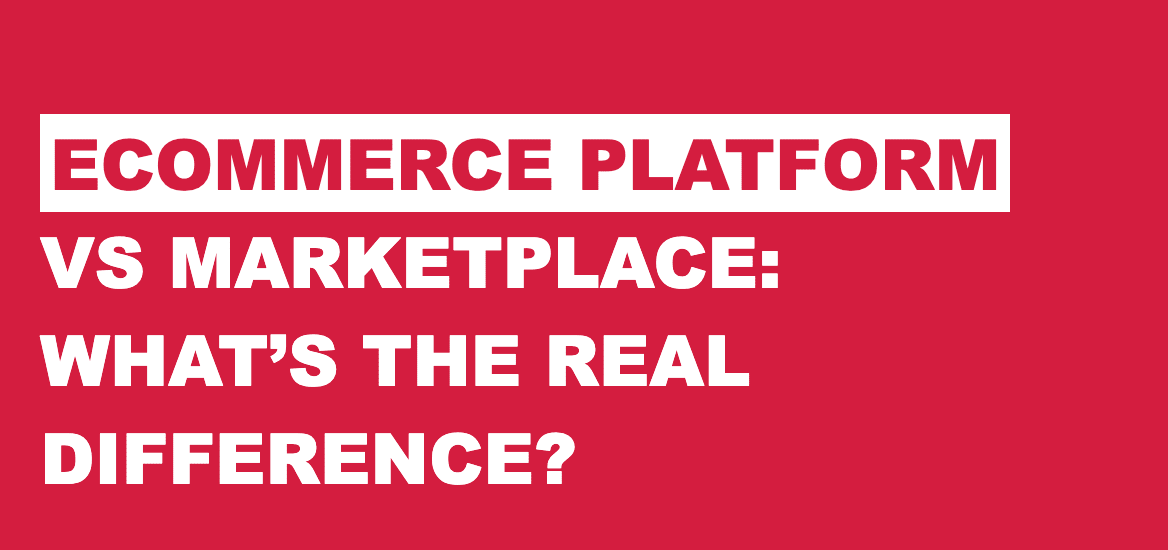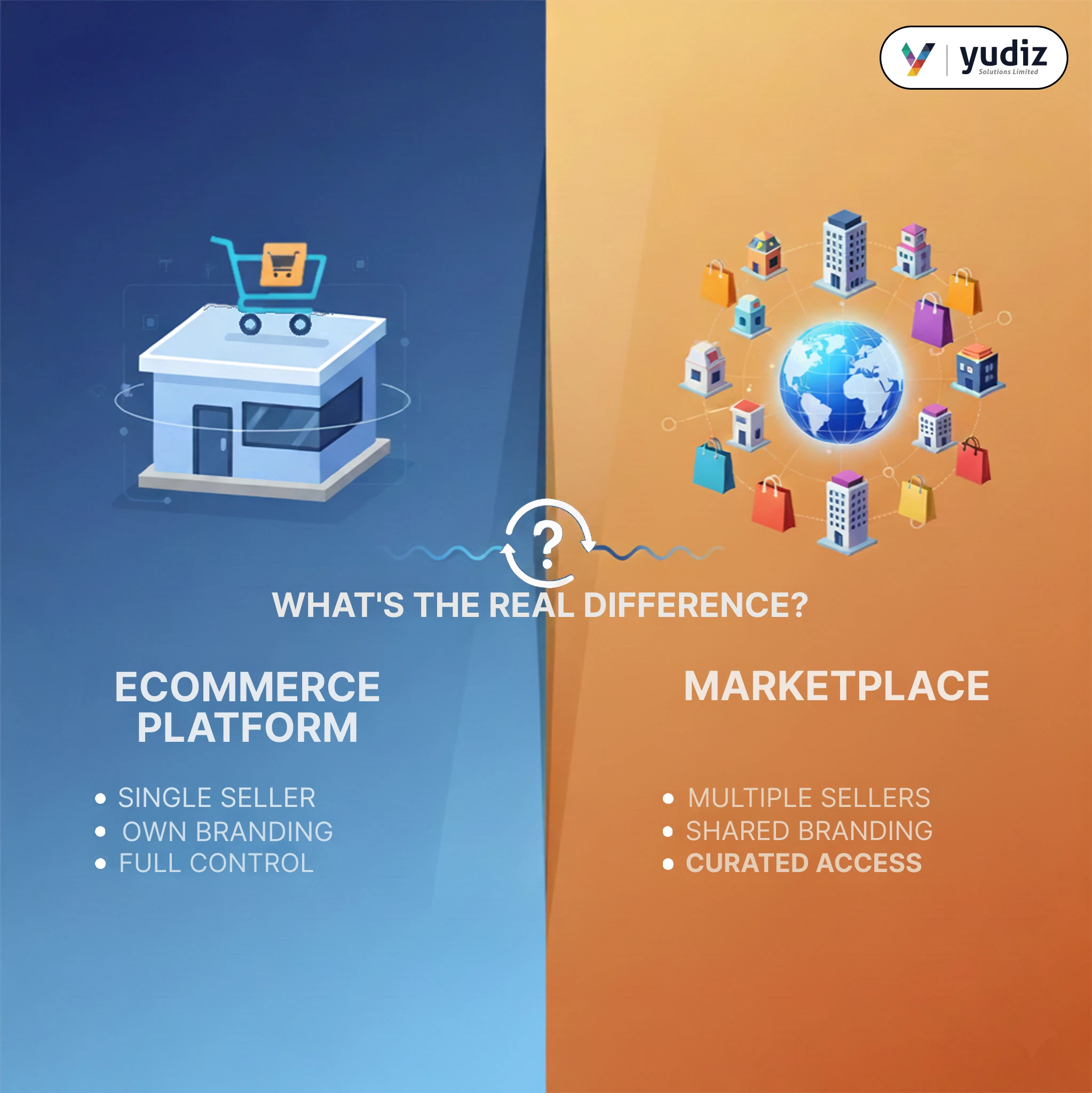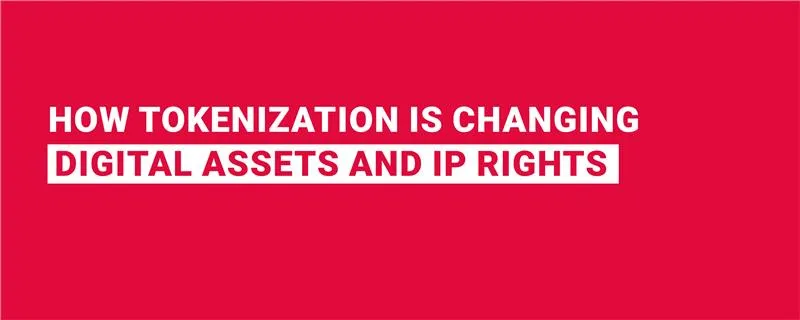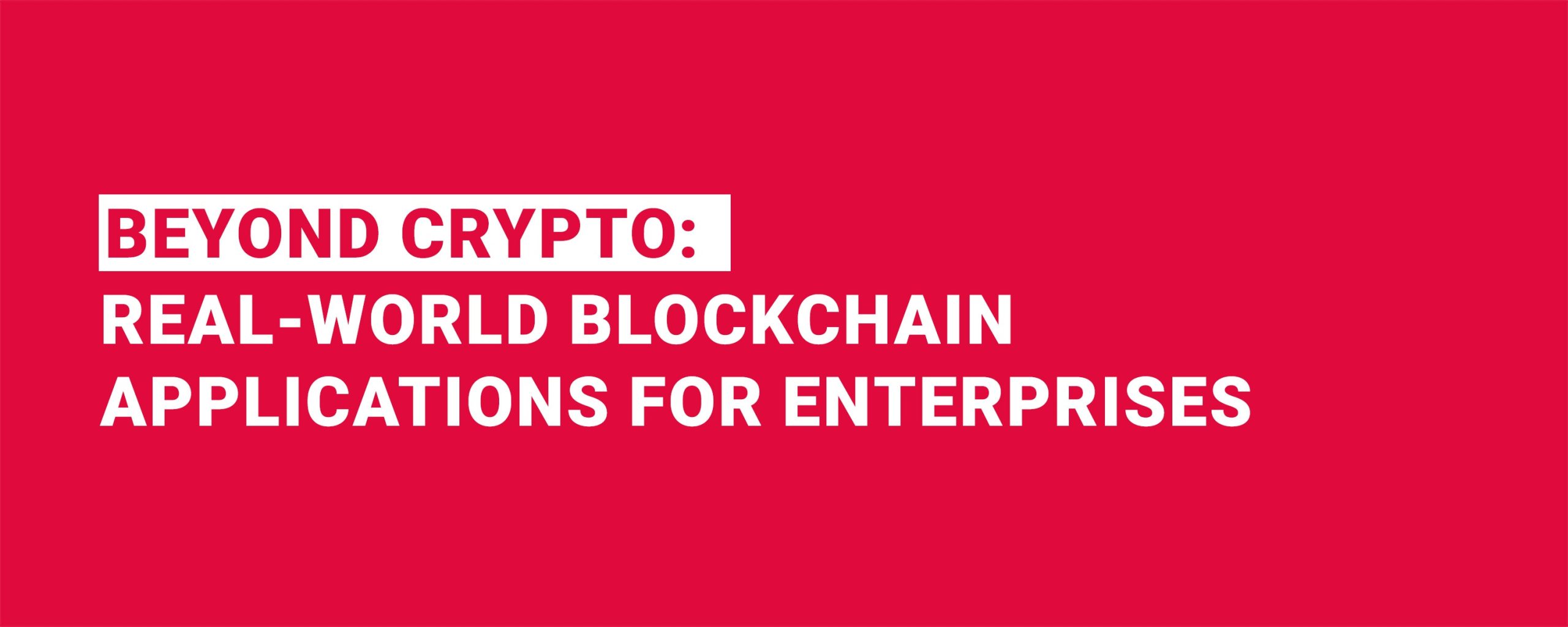eCommerce Platform vs Marketplace: What’s the Real Difference?

Many of the businesses are now going online for the buying and selling of products. Recently, there was a growing trend of online marketplaces that has now shifted to the ecommerce platform. However, ecommerce development has been a turning point for most businesses and also helps in increasing sales in the digital world. For a business, it is necessary to understand the concept of an e-commerce platform vs a marketplace.
Many businesses are still wondering what to choose between: ecommerce or marketplace? Each of them has its own advantages and disadvantages. It all depends on the business about which platform they prioritize, as per their business model and requirements. Let us explore in depth the marketplace vs the ecommerce platform.

What is a Marketplace?
The term online marketplace platform connects multiple buyers and sellers. Some of the examples are Etsy, Amazon, Walmart, and many more. Here, the seller lists their products on this marketplace platform that helps them benefit from a good customer database.
What is an Ecommerce platform?
Using an ecommerce platform allows businesses to develop their own online store and manage & operate the store with ease. There is no need to rely on any other third party. Some of the well-known platforms for ecommerce app development are Shopify, WooCommerce, Magento, and many more. Moreover, a business that opts for an ecommerce platform development can have full access to the branding, presenting products, pricing, and getting customer feedback.
Also Like : How Much Does It Cost to Develop a High-Quality eCommerce App?
Why Choose Ecommerce Over Marketplace Development?
1. Domain Name & Hosting
Make your own brand with ecommerce development. This is one of the main points in the marketplace vs ecommerce platform. A business can have its own personalized domain name that can be the business name itself. Here, it helps to create your own network space and gives you direct access to the admin panel
2. Customization
Your brand is your identity. Hence, as a business, if you would like to differentiate your business from others, it is possible with the ecommerce app development. This is because the ecommerce app is being developed as per the business, audience, objective, etc. However, this option is not available with the marketplace, as businesses will not have their own brand identity. In turn, they will have to follow the third-party parameters.
3. Visibility
When it comes to buying or selling products online, visibility is one of the vital elements to be considered. In terms of the marketplace, it all depends on the position & trust among the users. Hence, having an ecommerce platform will help to get to the top search position if you start working with the best marketing strategies.
Also Read : Future Trends in Ecommerce App Development in 2025
4. Investment
Businesses looking to invest in ecommerce development always need to think twice before moving into it. But still, it is going to be a myth. However, the reality is that this investment is expensive, but once you develop your own platform, then it will have a long-term margin. This will also help to increase sales much higher than those produced through the marketplace.
5. Competition
In the marketplace, there are more products of different brands, and so the competition increases. Hence, there are chances that the attention towards the product of your brand may decrease with multiple options available. To overcome this, developing an ecommerce platform can work out. This allows users to directly browse the products on your website or ecommerce app.
6. Earnings
There is a huge chance of earnings from an ecommerce platform as compared to a marketplace. In terms of the marketplace, some intermediaries charge a commission on each sale, and hence this results in additional costs as well. Hence, it is feasible to develop an ecommerce platform & earn with 100% margin even during the seasonal sale.
7. Customer Relationship
There is a limited reach with the customers while using the marketplaces. One cannot communicate with the customers or outside the platform. Also, it does not allow for announcements about the new launch, discounts, or any other notifications related to the product.
With the ecommerce platform, one can have complete access to the customer details right from their sign-up to their purchasing history and their type of products they look for. As a business, one can easily contact customers through different channels and keep them updated with the latest notifications.
Advantages of Choosing an Ecommerce Platform
- Full access to the data on the platform
- More customization options are available. Make a web or app of your own style, matching your business and creating your own brand identity.
- Better presentation of products & brand
- Can implement with the best marketing strategy & drive more traffic
- Offer with personalized customer service to the users
- Can have your own list of customers & can access the data anytime
- Have in-depth behavior analysis of users (visits, clicks, purchase, etc.)
- A great opportunity to create loyalty among the customers.
Also Read : How to Start an Ecommerce Business from Scratch?
Core Differences: Ecommerce Platform vs Marketplace
| Feature | Ecommerce Platform | Marketplace Platform |
|---|---|---|
| Ownership | Full access to the customer’s data | Limited control |
| Customer Base | Create your own customer base with the best marketing strategies | Customer base is limited based on the type of marketplace |
| Brand Identity | Strong brand identity with an ecommerce platform | Limited brand identity due to multiple products available on the marketplace |
| Marketing | Strong marketing with the best strategies like SEO, social media, etc. | Limited marketing options |
| Long Term Growth | Build brand equity and have a good long-term growth | Less brand recognition compared to an ecommerce platform |
| Profit | There are chances of a 100% profit margin with an ecommerce platform | There are commissions based with intermediaries in the marketplace on each sale. |
Future Aspects with Ecommerce Platform
In the coming years, ecommerce app development is going to reach its peak and will continue to grow.
- Enhancing customer experience with AI-powered personalization for ecommerce
- Filling the gap between the marketplace & platform using social commerce that includes Facebook, Instagram, etc.
- Implementing omnichannel strategies that define the brand and can operate across different points.
- Ecommerce is a long-term survival as customers are always attracted to quick access to the products.
Hire Our Team

Conclusion
The reality of an ecommerce platform vs a marketplace platform lies in the type of business and its budget. Comparatively, a business must opt for developing an ecommerce platform that helps it get more benefits from it. There are more chances to increase sales and have a long-term profit with the ecommerce platform. However, an ecommerce app development company can give an in-depth guide about the same and give a complete business solution.
Frequently Asked Questions
There is a huge difference between an eCommerce platform and a marketplace. With an ecommerce platform, one can design the store, manage customers & directly sell under their own brand name. While in the marketplace platform, it is like renting a stall in a big mall, such as Amazon or eBay.
It depends all upon business. If a business is looking for quick sales and exposure without much upfront effort, a marketplace is usually better because customers are already there searching for products. But if the priority is building a brand and owning customer relationships, then an eCommerce platform works best.
Choosing between an eCommerce platform vs a marketplace, what values the most is speed and control. If a business wants full control over its brand, customer data, and user experience, an eCommerce platform is worth the effort, even though it takes time and investment to grow.
Between eCommerce & the marketplace, one of the most valued things is speed & control. In terms of the marketplace, if you want to start selling fast, have a limited budget, then this is a good option to choose. Whereas in ecommerce, you can want full control over your brand, customer data, and user experience. Generally, businesses do testing with both. They will first sell products on the marketplace, then later shift to their own platform for long-term independence.
With an ecommerce platform, you can have control over branding, customer experience, and data, which helps to build loyalty. It becomes easy to handle marketing, operations, and traffic generation yourself, which takes time and money. The marketplace offers instant access to millions of potential buyers and built-in trust, but comes with high competition, fees, and limited branding.
For a long-term brand building ecommerce platform is the best option to choose. The reason to choose this is that it offers full control over the shopping experience, owns customer data, and can create loyalty programs or unique offers. While in the marketplace, customers do not remember the specific seller; they know only the platform, for example, eBay or Amazon. There is a risk of being replaced by cheaper competitors.
Yes, a business can use both an eCommerce platform and a marketplace. A marketplace helps you reach a wider audience quickly, while your eCommerce store builds brand loyalty and long-term customer relationships. A business can start with a marketplace where Customers may first discover you on Amazon or Etsy, but then visit your website for exclusive deals or repeat purchases. This is a smarter approach that balances short-term sales with long-term brand growth, while reducing risk from relying on a single channel.
















